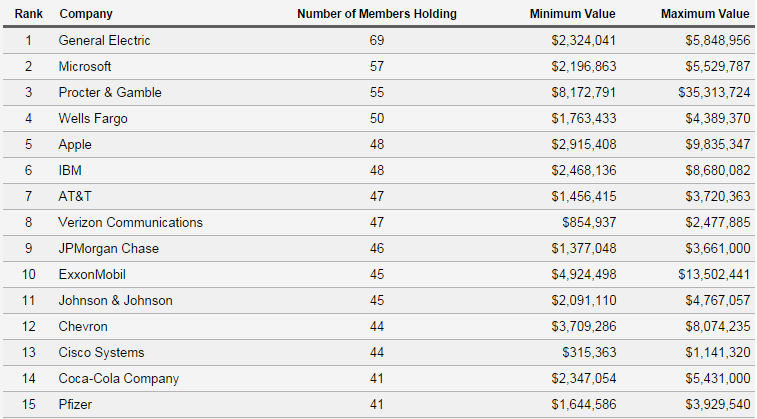
Which Companies’ Stocks Are Most Commonly Held By Members Of Congress?
November 13, 2014 -- MapLight is pleased to announce the launch of its personal financial disclosures database, a new tool that brings to light the fiscal relationships shared between legislators and private companies.
Each year, members of Congress file ‘personal financial disclosures’ (PFDs) regarding their various assets and sources of income. In these documents, legislators provide detailed lists of their investments in anything from real estate to mutual funds and company stock.
MapLight has compiled and organized this information into a single dataset searchable by politician, company, year, or Congressional session, with results categorized by income type (dividends, capital gains, etc.) and personal or spousal ownership. This data is made freely available to the public through a simple web interface and may also be downloaded as a CSV spreadsheet for deeper scrutiny.
Below is a MapLight analysis of the 2013 personal financial disclosures of members of the 113th Congress to identify the ‘top 15’ most popular company stock holdings and total amounts held*:
* Exact amounts are usually unknown; personal financial disclosure forms provide a fixed range of values with which to record the amount of an asset held.
Editor's note: If you use MapLight data, please cite us. MapLight is happy to provide additional details to journalists regarding specific personal financial disclosures data and to perform custom research inquiries. Please do not hesitate to call us if we can be of assistance.
Methodology: MapLight analysis of 2012 and 2013 personal financial disclosures and amendments through September 3, 2014 for members of the 113th Congress. Data source: Office of the Clerk, U.S. House of Representatives and Office of the Secretary of the Senate, U.S. Senate. Senate and House rules require the disclosure of assets belonging to the filers' spouses and/or dependent children, and these assets are included in the analysis. This analysis specifically investigates stocks and does not include other types of assets such as corporate bonds, notes, or bank deposits.
Photo via AND Inc/Shutterstock





